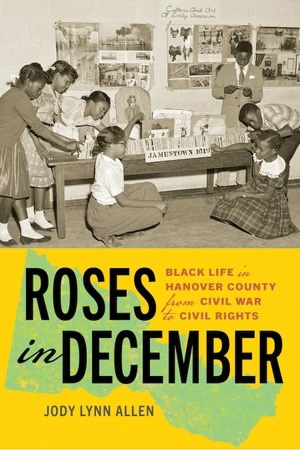Hanover author uncovers overlooked stories of Black history in ‘Roses in December’
By Lyndon German VPM | 10/23/2025, 6 p.m.
Jody Lynn Allen has always been fascinated by the striking gaps in history, and she was especially charmed by the stories she’s heard in her hometown Ashland — hidden histories that lingered just below the surface of Hanover County.
 In her latest book, “Roses in December: Black Life in Hanover County from Civil War to Civil Rights,” Allen chronicles a century of Black experiences from Reconstruction’s beginning in 1865 through the formal end of desegregation in 1964. The nonfiction work paints a portrait of a community that survived, resisted and built institutions of its own despite systemic barriers.
In her latest book, “Roses in December: Black Life in Hanover County from Civil War to Civil Rights,” Allen chronicles a century of Black experiences from Reconstruction’s beginning in 1865 through the formal end of desegregation in 1964. The nonfiction work paints a portrait of a community that survived, resisted and built institutions of its own despite systemic barriers.
Allen refers to this period historians dub as “the era of disfranchisement,” a term that captures an ongoing struggle for equality and recognition. Throughout her research, she said she discovered her “joy of finding what others had forgotten.”
“There were so many people who didn’t think I would find a lot of information, but I’m glad I decided to write about Hanover,” Allen said. “There are a lot of people who’ve been here all of their lives and, when you interview them, you’d be surprised about the stories that come out.”
Allen, a Hampton native and assistant professor of history at the College of William & Mary, focuses her research on the lives of Black Virginians from the Civil War through the Civil Rights Movement. However, her path to becoming a historian wasn’t straightforward.
“History has always been what interests me. I was the kid who was busy talking to my grandparents while everyone else was outside,” said Allen, who holds bachelor’s and master’s degrees in criminal justice. “I never worked a day in the criminal justice field, but it’s given me a better understanding of the history of Black imprisonment in this country.”
That curiosity became the foundation for “Roses in December.” The project, which began as her doctoral dissertation in 2007, soon evolved into a mission to fill in absences in the historical record.
Through years of research — sorting through newspaper clippings, unprocessed letters and hours of oral histories — Allen pieced together a mosaic of stories long overlooked within her home county. What she found was a community defined not just by hardship, but by determination and cultural strength.
“The books that I found in Hanover mainly were about plantations, the flowers, the architecture. They don’t talk about the enslaved because that’s not something people want to talk about,” Allen said. “But when you look, and you don’t have to look that deeply, you find it. It’s there — you have to take the time to look.”
Many of her interviews began with residents who doubted they had anything worth sharing — but for Allen, the process of uncovering Hanover’s Black history has been both an academic and personal journey — one that continues to inform her teaching and writing.
Among the stories featured in “Roses in December” are educators who fought to establish Black schools and campuses during Massive Resistance. That’s when local boards in Virginia closed public schools rather than follow desegregation mandates that followed the U.S. Supreme Court’s landmark 1954 decision in Brown v. Board of Education.
Other stories follow places such as Berkleytown, the community founded outside Ashland’s boundaries, or reveal through old correspondence George Washington Carver’s unreported visit to Hanover. There are also smaller tales — like that of Peter Storrs, a shoemaker on a path to purchase his freedom from his enslaver.
Each story, Allen said, adds a layer to Hanover’s larger cultural narrative and highlights the importance of memory — and how easily history can fade when it isn’t written down or passed on. If not for that process, Allen said she’d still not have a name for her book in the first place.
“I remember speaking to a woman after an event in Ashland and she told me a saying her mother had told her: ‘God gave us memory so that we might have roses in December,’” Allen said. “I knew right then and there that what I was doing was to remind people of the struggles they overcame to get where they are today.”







